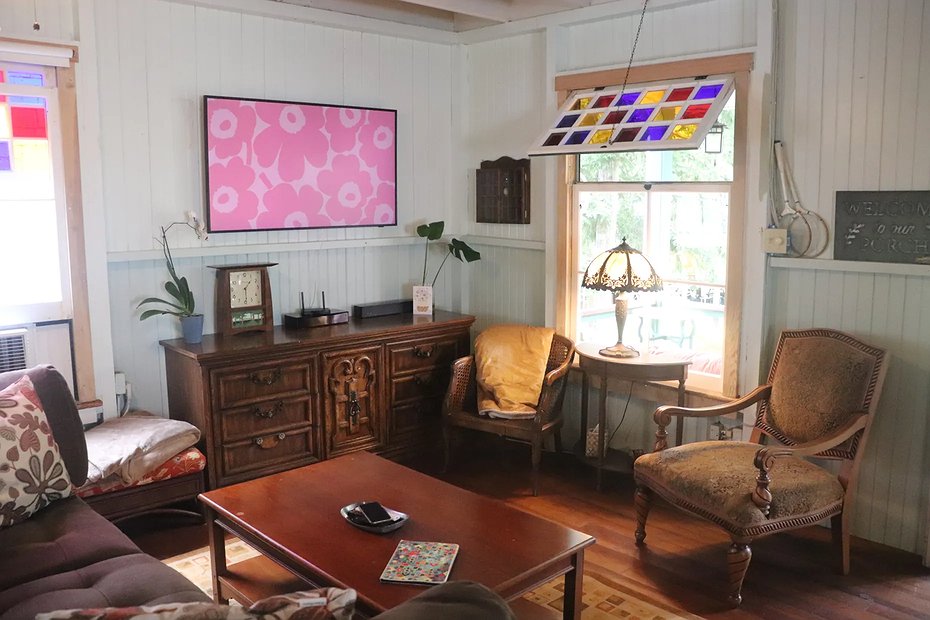The porches on the park's "Millionaires Row." Photo by John Worthington | The Reporter.
The park was founded in 1882 by Perkasie businessmen John Schwartz and Henry G. Moyer to rent to local churches for camp meetings and religious gatherings.
Hundreds took a step back in time to the Victorian era Saturday afternoon for Perkasie Park’s 11th annual Founder’s Day.
The event gave visitors the opportunity to participate in self-guided tours of the privately-owned park’s Victorian grounds and cottages.
“It’s really to showcase the park and make the community aware of it, because a lot of people in our community don’t know that it’s back here,” said Perkasie council member Scott Bomboy. “So it’s more of an open house for the community.”
The park was founded in 1882 by Perkasie businessmen John Schwartz and Henry G. Moyer to rent to local churches for camp meetings and religious gatherings. Meetings typically lasted seven to 10 days. Early attendees stayed in tents before the Park Association decided to build cottages to provide more comfortable lodgings.
“The cottages that were built were all originally one story,” said Perkasie Park historian Judy Pezzanite. “None of the cottages had kitchens or bathrooms, and that was because there were outhouses on the grounds, and you were expected to take your meal in the dining hall.”
The landscape changed in 1900 when a fire incinerated more than a dozen cottages. The Park Association quickly rebuilt the cottages on a grander scale, with running water, electricity, kitchens and bathrooms, in what is now dubbed, “Millionaires Row.”
“These cottages were pretty envious,” said Pezzanite. “And it was really good PR, because it was the first thing that people saw when they walked into the park, and they thought, ‘Wow this is quite a place.’”
The “center of life” in the park was the auditorium. Built in 1886, the auditorium was designed to hold 1,500 people but often housed significantly larger crowds.
“In 1890, 40,000 people attended camp meetings here in 10 days, with 23,000 people attending on one Sunday,” said portrayer Linn Lisher. “Two thousand teams of horses were parked next store or across the street.”
The auditorium was also used for nonreligious purposes, including Perkasie High School graduations and the Perkasie Memorial Day parade’s destination. National Park Service founder and former Pennsylvania governor Gifford Pinchot used the site for his 1920 gubernatorial campaign launch.
While most of the cottages were built by the early 20th century, a couple were constructed in the subsequent decades. Cottage 19 was built in the 1930s by a local evangelical minister.
“His church was torn down in the 1920s,” said Pezzanite. “He salvaged the stained glass and a lot of the pews and other wood, and he built his cottage with that.”
Today, the 21-acre park functions as a summertime community for Perkasie Park Association members, some of whom travel from as far as Texas, Florida and Arizona to spend their summers there. The auditorium still holds religious services from July 4th to Labor Day.
“We’re no longer affiliated with any church. It’s simply area ministers who want to preach here and bring their congregations here,” said Pezzanite. “It’s open to the public. And it’s kind of a lovely place to sit for a church service, because of the squirrels, the birds, etc.”
Bomboy said that the park, listed as a National Historic District in 2016, draws hundreds from across the region who are intrigued by the Victorian lifestyle.
“A lot of people come in from town and out of town, including people from New Jersey. It’s always a different crowd,” said Bomboy. “People are fascinated by the Victorian architecture and lifestyle. You don’t see anything like this anymore.”
This article appears courtesy of a content share agreement between North Penn Now and The Reporter. To read more stories like this, visit www.thereporteronline.com.
 The interior of cottage 19, built a local evangelical minister from the remains of a town church.
The interior of cottage 19, built a local evangelical minister from the remains of a town church.
By John Worthington | The Reporter